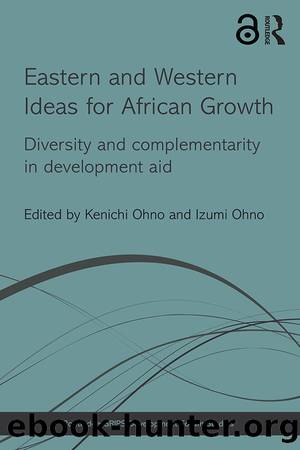Eastern and Western Ideas for African Growth by Unknown

Author:Unknown
Language: eng
Format: epub
Publisher: Taylor & Francis Group
Published: 2022-04-13T00:00:00+00:00
3 Japanese development experience matters
Growth only happens when it is politically possible. One crucial dimension to Japanâs economic recovery was the era of Prime Minister Ikeda for whom delivering economic growth meant political survival. In 1960 the renewal of the JapanâUS Security Treaty provoked violent nationwide protests. A sense of national crisis shook the confidence of the Japanese political, business and bureaucratic elite, and the previous government resigned in an atmosphere of political chaos. The new Ikeda government, from 1960 to 1964, deliberately sought a new national vision to avoid confrontation over political ideology. Ikeda, a former MITI minister, successfully refocused national attention on his plan to double Japanese GDP within a decadeâthis had succeeded by 1967. Ikeda was described as âthe single most important figure in Japanâs rapid growth. He should long be remembered as the man who pulled together a national consensus for economic growthâ (Nakamura 1987).7 Japanese politics now turned on the seichoritsu (growth rate). Charles De Gaulle offered another epitaph, allegedly asking after meeting Ikeda: âWho is that transistor salesman?â
Europeans who managed to visit Japan before the end of the Tokugawa regimeâs policy of isolation in the middle of the nineteenth century were always surprised to discover how effectively the country was run. The Swedish surgeon and naturalist Peter Thunberg, for example, travelling from Nagasaki to Edo (Tokyo) in 1776, was impressed how
both the supreme government and the civil magistrates make the welfare of the state, the preservation of order, and the protection of the persons and property of the subject, an object of greater moment and attention in this country than in most others.
(Voyage de C.P., 1796, IV, p.11)
This political strength combined with a strong work ethic developed a political system of reinforcing the stateâs legitimacy through building its administrative capabilities and political responsiveness to the needs of the population, with long-term consequences for commitment to the success of the private sector (Morishima, 1982). Japan successfully evolved from feudal to global power within two generations, but Japanese industrialisation was by no means self-evident. A German economist visiting Japanese factories in the late 1880s reported that âJapanese workers work relatively little and that all work progresses only slowlyâ (Rathgen, 1891, p.422). The political elites of the Meiji Restoration that overthrew the feudal Tokugawa regime in 1868 were determined to preserve Japanâs political independence through economic wealth and military power. Aware of the dangers of dependency, their unifying vision was to overcome this external threat: subservience to foreign powers âis a deep-seated disease afflicting vital areas of the nationâs lifeâ (Fukuzawa, 1875 [1931], p.189). An effective state was essential and, mirroring continuing argument about modernisation theory about autocratic rule âto get things doneâ, even ardent democrats throughout the Meiji period were much concerned that the constitutional government could lead to violent rifts in the national political consensus that would set back progress in both political and economic development (Przeworski et al., 2000).8
British observers of Meiji Japanâs early development prospects were however scathing:
In this part of the world,
Download
This site does not store any files on its server. We only index and link to content provided by other sites. Please contact the content providers to delete copyright contents if any and email us, we'll remove relevant links or contents immediately.
The Hatha Yoga Pradipika (Translated) by Svatmarama(2498)
Real Sex by Lauren F. Winner(2481)
The Holy Spirit by Billy Graham(2427)
The Secret Power of Speaking God's Word by Joyce Meyer(2258)
The Gnostic Gospels by Pagels Elaine(2034)
Devil, The by Almond Philip C(1906)
23:27 by H. L. Roberts(1895)
Jesus by Paul Johnson(1892)
The Nativity by Geza Vermes(1853)
All Things New by John Eldredge(1786)
Chosen by God by R. C. Sproul(1766)
Angels of God: The Bible, the Church and the Heavenly Hosts by Mike Aquilina(1630)
The Return of the Gods by Erich von Daniken(1578)
Angels by Billy Graham(1555)
Evidence of the Afterlife by Jeffrey Long(1463)
Knowing God by J.I. Packer(1436)
The Gnostic Gospel of St. Thomas by Tau Malachi(1414)
Victorian Sensation by James A. Secord(1410)
How To Be Born Again by Billy Graham(1407)
